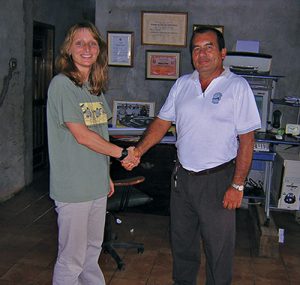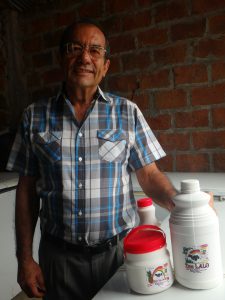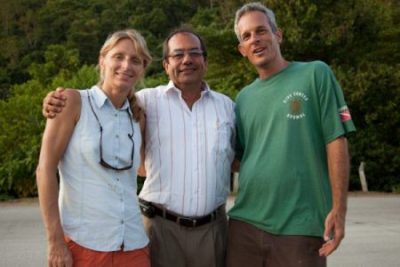 2019 marks the 15th anniversary of the Lalo Loor Dry Forest Reserve , thanks to the commitment of Eudaldo “Lalo” Loor, a conservation-minded dairy farmer. We met Lalo while seeking pristine examples of coastal dry forest for tropical ecology courses, and the reserve gradually grew into a focal point for environmental education and conservation programs. You can read more about Ceiba’s work in and around the reserve in our annual newsletter, Kapok. But recently, Lalo took some time to recount his history on the coast of Ecuador, where he was born and raised, and how his experiences there influenced the journey he has taken towards becoming a staunch conservationist.
2019 marks the 15th anniversary of the Lalo Loor Dry Forest Reserve , thanks to the commitment of Eudaldo “Lalo” Loor, a conservation-minded dairy farmer. We met Lalo while seeking pristine examples of coastal dry forest for tropical ecology courses, and the reserve gradually grew into a focal point for environmental education and conservation programs. You can read more about Ceiba’s work in and around the reserve in our annual newsletter, Kapok. But recently, Lalo took some time to recount his history on the coast of Ecuador, where he was born and raised, and how his experiences there influenced the journey he has taken towards becoming a staunch conservationist.
(Carta de Lalo Loor: Español)
“I was born in the central part of the Manabí province, and it grieves me to see the deforestation in this region. I recall the riverbanks were full of trees, and above where the rivers met the sea, in those estuaries you could see the throb of life in its natural state, thousands of acres of mangroves that revealed to us nature in its purest state, and we could only imagine all the animals that resided there.
When I arrived in Camarones, there were only dirt roads and the vegetation in the region was in-tact. In the area I inherited from my father, there was a beautiful forest of approximately 200 hectares. Visualizing what would happen in the coming years motivated me to conserve and implement dairy farming techniques that were better for the environment without negatively impacting my income, which allowed me to preserve this forest of, for me, immeasurable worth.
After a few years, I returned once again to the estuaries and hills that I hadn’t seen since I came to live in Jama. I was truly horrified by the abrupt change, in those areas once so beautiful and natural I saw only small, contaminated streams remained as well as enormous pools for shrimp farming, without a single tree to shelter them. I was happy to have made my decision because the forest continued providing shelter for animals and giving us clean air and water, which, every day becomes more scarce and costly.
The process of conservation isn’t easy, and I found a valuable ally in the Ceiba Foundation to be able to make my desire to conserve a reality. With their international conservation experience, we started working towards this dream of a primary forest thriving near the sea. With the help of the Foundation, directed by Catherine Woodward and Joe Meisel, we directed ourselves to ecotourism and scientific tourism, opening nature trails to demonstrate the beauty of Ecuador and the world, and granting access to research the reserve’s special and entrancing variety of plant and animal species.

Due to increasing deforestation, the forests that remain become more valuable and susceptible to illegal hunting and logging, so that, with the help of the Ceiba Foundation, we had and continue to have difficult tasks, caring for and preventing the desctruction of this small natural paradise, especially considering that the forest laws in Ecuador are still lenient towards these types of offenses.
With the help of the Foundation and the Jama Municipality, we began a project to empower and instruct school teachers to educate and create an environmental awareness among students. The results were excepcional, promoting the communities’ help to protect the reserve and the environment in general.
As I said earlier, conservation is a difficult path and it is better to travel accompanied. With the Ceiba Foundation, we have commonality in environmental goals and we have acheived important advances. I am very satisfied with the work and accomplishments but there is still much to do and I hope to rely on our collaboration so that we can continue the preservation of these spaces essential for life and the future of humanity.”
– Eudaldo Loor, October 2018
Photos: Top – Catherine Woodward and Eudaldo “Lalo” Loor shake hands at the signing of their conservation agreement in 2004. Above – Lalo is a well-known producer of delicious yogurts. Bottom – Lalo Loor (center) with Catherine Woodward and Joe Meisel in Ecuador.
“Nací en la zona central de la Provincia de Manabí, y me toco ver el proceso de deforestación que sufrió toda ese sector, recuerdo que los ríos en sus riveras estaban llenos de árboles, el sauce llorón era el más abundante, había mucha vegetación en las colinas y en división de las propiedades, pero sobre todo en la salida de los ríos al mar, en esos estuarios se veía como latía la vida en su estado natural miles de hectáreas con mangle nos mostraban a la naturaleza en su estado más puro y, solo podíamos imaginarnos a todos los animales que habitaban allí.
Cuando llegue a Camarones, solo había caminos veraneros y la vegetación del sector estaba intacta y en la parte que mi padre me heredo, había un hermoso bosque de aproximadamente doscientas hectáreas, que visualizando lo que pasaría en los años siguientes me motivo conservar, e implemente técnicas ganaderas mas amigables con el ambiente y sin sacrificar mi fuente de ingreso en la ganadería me permitiera mantener este bosque para mí de incalculable valor.
Después de algunos años me toco recorrer de nuevo los estuarios y las colinas que no veía desde que me vine a vivir a Jama, me quede realmente horrorizado del cambio tan brusco en tan pocos años, en esos lugares tan lindos y naturales, percatándome que solo quedaban pequeños riachuelos contaminados y enormes desiertos de piscinas para camarón en cautiverio, sin un solo árbol donde cobijarse. Me alegro mucho de haber tomado esa decisión, por que este bosque sigue cobijando animales y nos provee de aire y agua limpia, donde esto cada día es mas escaso y costoso
Pero el proceso de conservación no es fácil, y encontré en la Fundación Ceiba un aliado muy valioso para poder cristalizar este deseo de conservación, con la experiencia internacional en temas de conservación empezamos a trabajar para llevar adelante este sueño de un bosque primario floreciendo cerca del mar. Con ayuda de esta fundación dirigida por Catherine Woodward y Joe Meisel, nos encaminamos a el Ecoturismo y al Turismo Científico, abriendo senderos ecológicos para poder mostrar esta belleza al Ecuador y al mundo, y dando paso a la investigación por ser una reserva de vida tan especial y poseedora de variedades y especies muy interesantes en el mundo vegetal y animal.
A medida que la deforestación aumenta, los bosques que quedan se vuelven mas valiosos y sensibles a la caza y la tala ilegal, de modo que con ayuda de la Fundación Ceiba tuvimos y tenemos una tarea difícil de enfrentar, cuidando y evitando que destruyan este pequeño paraíso natural, considerando que las leyes forestales en Ecuador son todavía permisivas a este tipo de delitos.

Con la ayuda de la Fundación y el Municipio de Jama, se inicio un proyecto de capacitación de profesores para crear conciencia sobre la conservación con resultados sobresalientes, ayudando a que los vecinos ayuden en la protección de esta reserva y del ambiente en general.
Como decía anteriormente, la conservación es un camino difícil y es mejor recorrerlo acompañado, con la Fundación Ceiba tenemos coincidencias importantes en el tema Medioambiental y hemos conseguido importantes avances y estoy muy satisfecho del trabajo y las metas logradas, pero falta por hacer y espero contar con su colaboración para que podamos seguir en la preservación de estos espacios fundamentales para la vida y el futuro de humanidad.”
– Eudaldo Loor, Octubre 2018